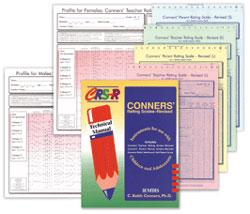|
| ||||||||||||||||||||||||||||||||||||||||||||||||||||||||||||||||||||||||||
This revision adds a number of enhancements to a set of measures that has long been one of the standard instruments for the assessment of attention deficit/hyperactivity disorder (ADHD) in children and adolescents ages 3-17 years. Items have been added that match the symptoms for ADHD outlined in the Diagnostic and Statistical Manual of Mental Disorders-4th Edition (DSM-IV™). Published using the QuikScore™ format, the CRS-R evaluates problem behaviors as reported by the teacher, parents or alternative caretakers, and adolescents. As with the original CRS, the new scales are valuable tools for measuring treatment changes as well as for program evaluation. All three instruments (Parent, Teacher, and Self-Report) contain scales created through factor analyses to assess a broad range of significant problem behaviors. In addition, all three instruments contain rationally created scales (the ADHD/DSM-IV scales) that correspond with DSM-IV™ criteria for ADHD; they also contain a new empirically created index for assessing children and adolescents at risk for a diagnosis of ADHD. The widely used Hyperactivity Index for parent or teacher ratings (renamed the Conners’ Global Index) also is included on the parent and teacher forms. Normative data for the revised forms come from 11,000 community-based children and adolescents throughout the United States and Canada. Both Long (CPRS-R:L) and Short (CPRS-R:S) Forms have been developed to assess problem behaviors reported by parents. Normative data for these revised scales come from the ratings of more than 2,000 parents. Both Long (CTRS-R:L) and Short (CTRS-R:S) Forms have been developed to assess behaviors reported by teachers. Normative data for these revised scales come from the ratings of approximately 2,000 teachers. The Conners-Wells’ Adolescent Self-Report Scale: Long (CASS:L) and Short (CASS:S) versions have been developed to assess self-reports of problem behaviors. Normative data for these new scales come from the ratings of over 3,000 adolescent respondents. Note: • The CRS-R scales are perfectly suited for use in managed care settings. The scales allow for the quantification and measurement of a variety of behavior problems. • CRS-R scores help to identify when treatment is necessary, whether treatment is effective, and when treatment should be terminated. The short scales are particularly useful for frequent monitoring of a child’s status. • QuikScore™ Forms are designed for easy administration, scoring, and profiling of results. • Feedback Forms are designed to provide professional-looking assessment feedback and presentation of results. |



